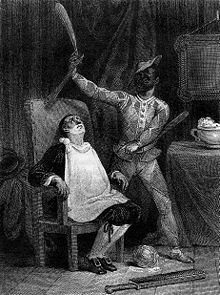The Barber of Seville (play)
Though the play was poorly received at first, Beaumarchais worked some fast editing of the script, turning it into a roaring success after three days.To ensure that she really loves him and not just his money, the Count disguises himself as a poor college student named Lindor, and attempts to woo her.The Count, disguised as a poor university student, waits in hope of catching a glimpse of Rosine, whom he encountered in Madrid and has followed to Seville.Figaro tells the Count that Rosine is the ward of Dr. Bartholo, and adds that as he is the doctor's barber and apothecary, he frequents the house.At this point the Count enters disguised as an inebriated soldier, and sings a song to the tune of "Vive le vin".Rosine comes back out to yell at him, and tell him she knows all about his horrible scheme to kidnap her: she notices that Figaro keeps addressing him as "my lord", however, and inquires as to the reason.Giovanni Paisiello's The Barber of Seville, dramma giocoso in four acts first performed in 1782, is probably the earliest opera adaptation still occasionally heard in the repertoire.Figaro is inspired by the commedia dell'arte character of Brighella,[4] and like his predecessor he is a clever liar; moral and yet unscrupulous; good humored, helpful and brave, though somewhat embittered and cynical.When The Marriage of Figaro went into production almost a decade later, however, he felt himself too old to repeat the part and turned it over to fellow actor Jean Dazincourt.[6] According to the information Figaro gives at various points throughout the plays, his life story appears to be thus: he was the illegitimate son of Dr. Bartholo and his maid Marceline, and presumably therefore given his mother's family name, was born Emmanuel de Verte-Allure.After he grew "disgusted with their ways" he left to become a surgeon, and apparently took up a short-term job in the household of Count Almaviva during this time to support himself.Though the Count referred to him as a "rather bad servant," he was pleased enough with Figaro to write him a recommendation to the Bureau in Madrid, where he was given a job as an assistant veterinary surgeon, much to his disappointment.Given that Suzanne's uncle Antonio works for the Count, it seems likely she was hired on his recommendation when the Countess moved into the palace and a maid was needed for her, in which case she and Figaro would have met after the events of The Barber of Seville.In The Guilty Mother, the children of the Count and Countess are named, but no offspring from Figaro or Suzanne are referenced, which suggests they remain childless.

Le Barbier de Séville (film)The Barber of Seville (disambiguation)commedia dell'arteHarlequinFrenchPierre BeaumarchaisAntoine-Laurent Baudronopéra comiqueComédie-ItalienneComédie-FrançaiseTuileriesThe Marriage of FigaroThe Guilty MotherTirso de MolinaEl Burlador de SevillaMozartfirst namesurnamelove at first sightbarbergrandeebag of moneyGiovanni PaisielloThe Barber of SevilleGioachino RossiniNicolas IsouardAlexander ReinagleSamuel ArnoldFrancesco MorlacchiJean Barnabé AmyBrighellaPrévilleJean Dazincourtgypsiesbarber surgeonCastillesla ManchaExtremaduraSierra MorenaAndalusiaWikisourceChisholm, HughEncyclopædia BritannicaIl barbiere di SivigliaLargo al factotumThe Barber of Seville discographyLe Barbier de SévilleAdventures of the Barber of SevilleOur Gang Follies of 1938Rabbit of SevilleMagical MaestroThe Cat Above and the Mouse BelowThe BarberThe Crazy Day or The Marriage of FigaroSe vuol ballareNon più andraiSull'aria ... che soave zeffirettoThe Marriage of Figaro discographyFigaroFantasy on Themes from Mozart's Figaro and Don GiovanniLa mère coupableThe Ghosts of VersaillesI due FigaroFigaro läßt sich scheidenThe Abduction of FigaroFigaro Gets a DivorceJacques OffenbachOperasDie RheinnixenThe Tales of HoffmannBalletsLe papillonGaîté ParisienneManuel RosenthalLes deux aveuglesTromb-al-ca-zar, ou Les criminels dramatiquesOpéretteLa rose de Saint-FlourUne demoiselle en loterieLe mariage aux lanternesLa chatte métamorphosée en femmeUn mari à la porteDaphnis et ChloéIl signor FagottoPomme d'apiPierrette et JacquotOpérette bouffeLe financier et le savetierLa bonne d'enfantVent du soir, ou L'horrible festinMesdames de la HalleApothicaire et perruquierOpéra bouffeCroquefer, ou Le dernier des paladinsOrphée aux enfersGeneviève de BrabantBarkoufM. Choufleuri restera chez lui le …Le pont des soupirsBavard et bavardeLa belle HélèneBarbe-bleueLa vie parisienneLa Grande-Duchesse de GérolsteinLe château à TotoL'île de TulipatanLa PéricholeLa princesse de TrébizondeLes brigandsMadame l'archiducLe docteur OxMaître PéronillaL'alcôvePépitoLa chanson de FortunioMonsieur et Madame DenisLes bergersLa permission de dix heuresRobinson CrusoéVert-VertFantasioLa jolie parfumeuseBagatelleLa créoleMadame FavartLa fille du tambour-major